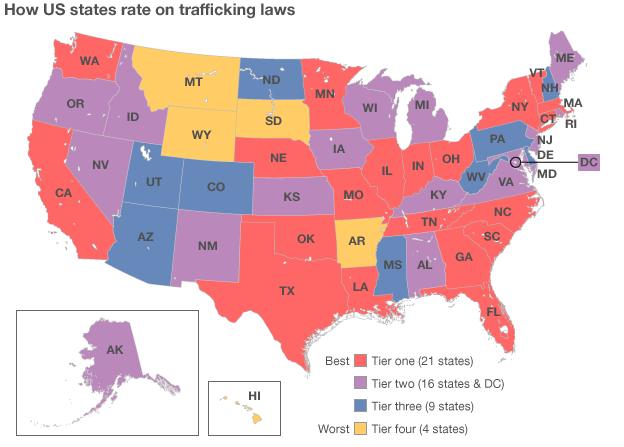Human trafficking: How US states fare
- Published

States as ranked by the Polaris Project
A new report looks at the laws US states use to protect victims of trafficking.
Human trafficking is often called modern-day slavery. Women and men are exploited and degraded while their traffickers become rich.
In the US, sex trafficking and domestic servitude are not uncommon, but often hidden from view: women smuggled across borders and coerced into prostitution; people who don't speak English working round the clock as domestic staff, unaware of their legal rights; young people out of school and looking for work lured into travelling sales jobs that turn into forced labour.
The Polaris Project, a US-based anti-trafficking organisation, has identified 10 types of statues they deem critical to fighting human trafficking.
"Passing these laws is literally saving lives," says Mary Ellison, the director of policy at the Polaris Project.
"Without them, victims are going to languish in exploitative situations and traffickers will continue to make lots of money."
In their most recent report, they ranked states according to their legislative record on trafficking.
They flag four "faltering" states which aren't doing enough to establish laws to curb this trade: Montana, South Dakota, Arkansas and Wyoming.
Ms Ellison says progress has been made since the Polaris Project released last year's ranking.
"The broad picture is more than half of the states have passed new laws in the past year, so that's incredible," she says.
"We have a horrible, high-profit, low-risk crime and human rights violation going on in our country and we're establishing a proper legal framework to deal with this."
Massachusetts has gone from being a state with one of the worst legislative records on human trafficking to one of the most improved, according to the Polaris Project's rankings. Ohio, South Carolina and West Virginia are also rated most improved.
In the past year, Massachusetts has not only passed an anti-trafficking law but started prosecuting traffickers too.
Massachusetts Attorney General Martha Coakley told the BBC in a statement: "We are proud to be recognised as the most improved state by Polaris Project.
"The recent passage of a human-trafficking law in Massachusetts recognises that these crimes are happening in our own communities, and gives us the tools to combat those crimes and offer critical services to victims."
Wyoming, on the other hand, is the only state in the union not to have passed any laws specific to human trafficking.
But law enforcement officials there say the small state doesn't need separate legislation to help victims.
"We're a small rural district. We don't experience the same type of problems in a place like Wyoming that perhaps folks in a place like Chicago or New York do, or even in bigger states like Indiana or Iowa," says Jim Anderson, a federal prosecutor stationed in Wyoming.

In June, Florida signed two bills imposing harsher penalties on human traffickers
Because of their size and limited resources, he says the state relies more heavily on assistance from federal prosecutors and federal laws against trafficking.
"It's unfair to label Wyoming as a state that is not concerned about this type of issue," he says.
"We have worked to form a task force with state and local and federal law enforcement to address these types of cases when they come up. So far, we don't think anything has fallen through the cracks."
Ms Ellison says that federal prosecutors have limited resources, and take on the cases which are bigger in scope. "Having the ability to also prosecute through the state court provides added tools," she says.
The scale of human trafficking in the US is hard to gauge, but the National Human Trafficking Resource Center hotline, operated by Polaris Project since December 2007, has received more than 57,000 calls from every state in the union.
Incidences of sex and labour trafficking have been reported in all 50 states in the US, and the District of Columbia, in the last two years.
According to the National Center for Missing and Exploited Children, more than 100,000 minors are estimated to be in the commercial sex trade in the United States.